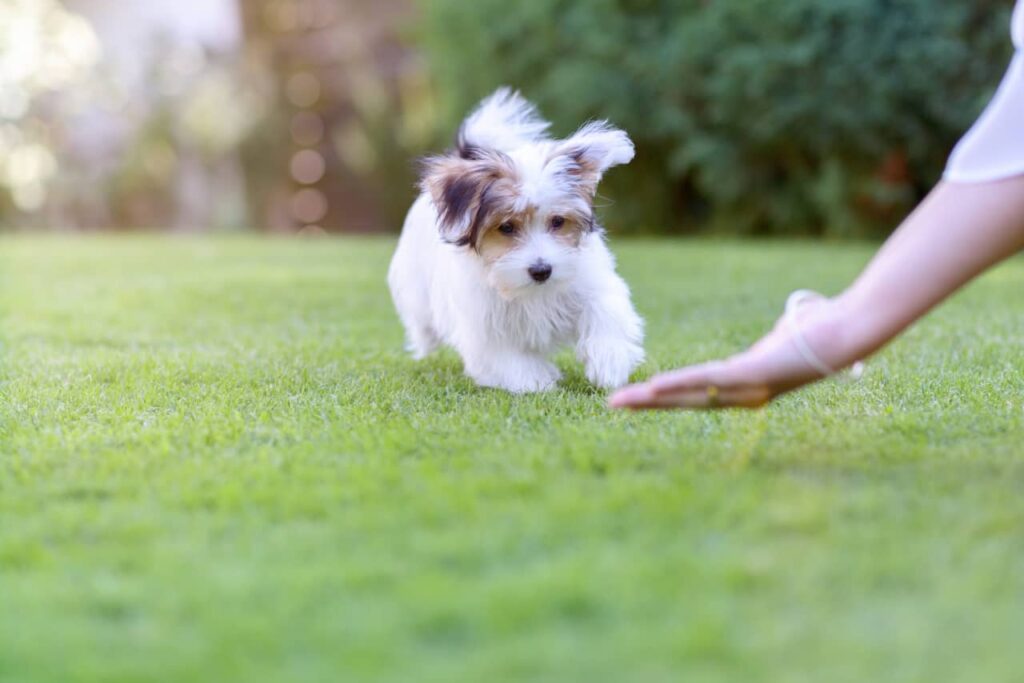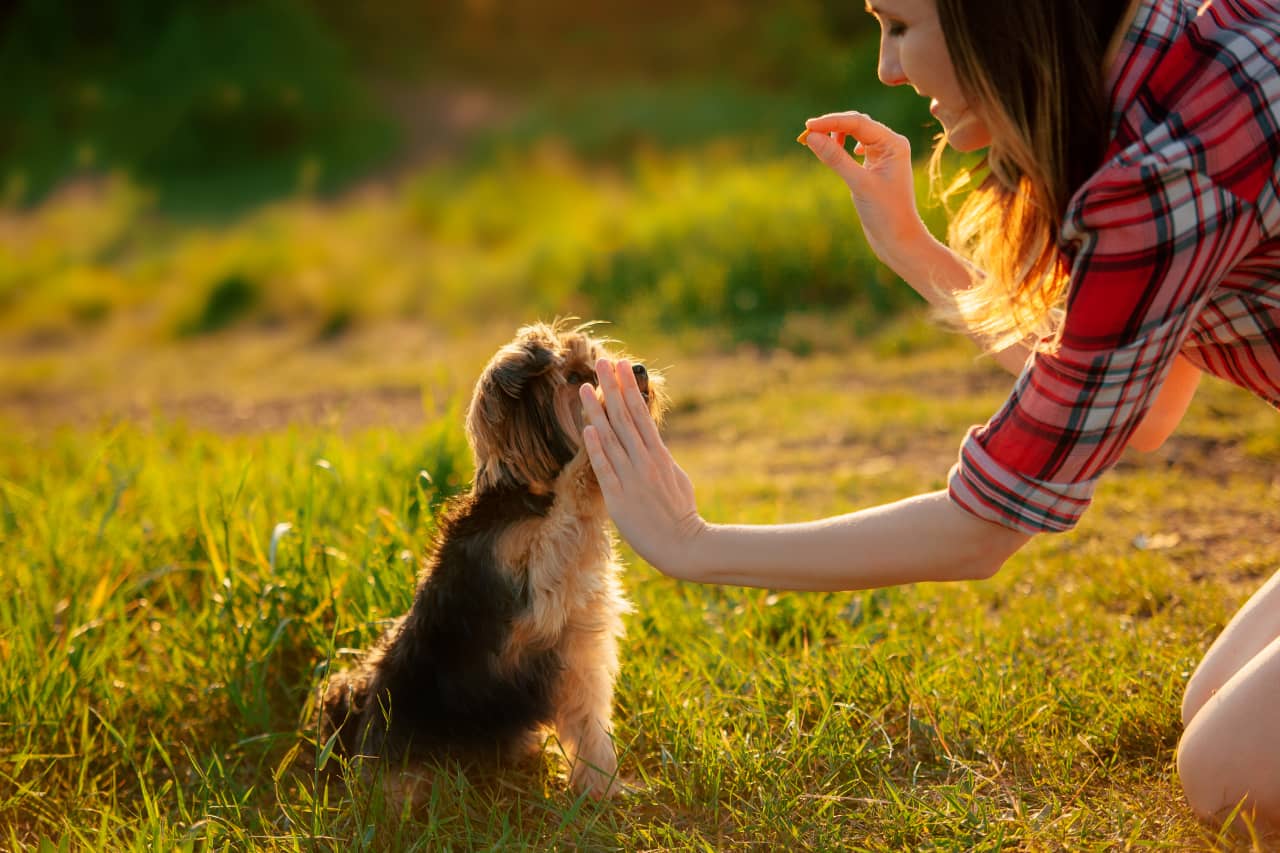The first few days of having a puppy at home are full of fun and cheerfulness as the little furry friend explores a new environment. And during that time, you’ll somehow learn how to handle feeding and cleaning after the puppy and ensure that it’s well cared for in your living space.
While it’s exciting, being a dog parent is also a big commitment. It is especially true since they’ll need constant care and attention. And as you and your puppy continue to bond, you need to decide when to start introducing it to your world by defining what’s acceptable and what’s not.
When To Start Training Your Puppy?
Generally, there’s no rule book to advise or tell you when is the best age to start training a puppy, but it’s advisable to begin foundational training as early as eight weeks.
Seeking guidance from professional K9 handlers can be a great place to start. They can guide you on the steps to take as you and your furry pal navigate this phase. Such training can help sharpen your puppy’s behavior through communal boarding services, and you’ll have a well-trained loyal friend.
Furthermore, here’s a quick guide to some activities and milestones and the best age to teach your young puppy:
8-10 Weeks Old
During this time, it’s recommended to start teaching your young pup basic things like manners, perceiving their name, their new home, and even the household members they’ll be around most of the time. Give them room and time to adjust and be comfortable with their new environment and people. It is essential as it can help your furry friend connect with you and provide a sense of belongingness.
You can also introduce, bit by bit, a routine they can stick to daily. For instance, you can start training them on where their dish is and what time to expect food from you. You can also incorporate basic lessons that are beneficial as they grow. Here are some of them:
-
Potty Training
Potty training is one of the top priorities for most pet owners. It is a crucial skill you’d want your puppy to learn early and familiarize themselves with. It can help avoid potty accidents around your house that may cause property damage or leave an unpleasant odor.
You may begin by scheduling time for potty training. Puppies, in general, have small bladders, but keep in mind that timings may differ from one pup to another. That said, ensure that you track and monitor your puppy’s habits as you go along. For instance, in most cases, dogs will almost immediately want a bathroom break upon waking up or after they have had their meals. With that, you can take them out for a 20-minute walk or guide them to the proper place where they can do it.
As your pup grows, the potty-training schedule may change since the dog’s intestines are growing bigger and can store more food. As such, ensure that you continue monitoring them so you can adjust accordingly. -
Crate Training
While some pet owners may not like the idea of their pup being caged, crate training can allow your young pup to find safety and comfort in confinement. It lets them see the crate as a safe place where they can sleep and rest and not as a form of punishment.
You can start by calmly guiding them towards the crate. Take your time and ensure that you don’t force your pup as it may instill fear. This is important since, as much as possible, you’d want to create a positive association with the crate. You can put a mattress for comfort, toss treats inside to entice them or reward them when they go in until they’re comfortable enough to walk in by themselves.
However, you don’t want to keep your paw friend in the crate for too long. Long-term confinement may affect your dog physically and emotionally.
10-12 Weeks Old
At this point, your pup is starting to be familiar with the new environment and the basic routine you have established. And as the puppy ages, you can begin introducing them to more advanced lessons such as:

-
Socialization
Aside from getting your pup acquainted with the people in your household, it is also essential that they socialize with the outside world. It can help the puppy know other people exist and learn about new experiences and environments. Puppies’ socialization can also aid in building personality and confidence.
Furthermore, socializing can help them be exposed to various elements that pertain to their senses. Through this, you can know how your furry friend will react to unfamiliar people around them, such as unnecessary barking or jumping up and down when excited. Thus, it can help you develop a training plan on how you can keep your pup calm when around strangers and in a new environment.
-
Leash Training
Puppies get easily distracted and can run off without notice toward whatever is making them curious at that time. With that in mind, you’d want to get a leash as a control measure to avoid chasing them down the streets or around your neighborhood.
You can start by introducing the concept of a leash and allow them to get used to it. You wouldn’t want to scare your pup off but instead create a positive and fun association with it. You can practice indoors as you let them get comfortable wearing it.
Since it’s a puppy you’re training, a 6-foot leash can be enough to control them. It can provide them with plenty of room to move around and explore as you walk outdoors without constraining them. Consider buying an adjustable leash, and you also want to be mindful of the kind of restraint you have to avoid choking the puppy.
On that note, when walking a dog, it should be by your side, not pulling you forward or dragging it to keep up with you. As you take your dog for a walk, you can stop often, let the puppy heed your instructions, and know you’re in control.
3-4 Months
Consistency is essential as you train your furry friend. As they grow, you can incorporate play sessions, including fetch games, obstacle courses, hide-and-seek, or even teaching your pup new tricks. Doing so can enhance your dog’s cognitive functions and coordination.
Furthermore, you can proceed with advanced training such as:
-
Obedience Training
Obedience training is equivalent to a boot camp, and a puppy can start at the age of between 12 to 15 weeks. The obedience class should ideally come after house training and socialization since the dog is learning to be independent in a new territory away from maternal care.
The course content or framework is generally not heavy since you’ll be teaching your young pup to listen to your instructions. Your goal is to help them to know what’s acceptable in your presence and how to behave when around people.
Tips on Training Your Puppy
Training puppies should be fun and engaging. Not only can it help them know the basics, but it also allows them to bond and creates a connection with you. Here are some tips worth considering as you carry out the training.
-
Be Patient
Training a puppy can be a lengthy process, and it may take a long time before they grasp the lesson. Dogs may become scared and anxious, so take your time and be patient with the process. Furthermore, consistency is the key, so continue practicing.
-
Reward Your Pup
Most pet parents use rewards to support their training goals and achieve great results. For instance, using puppy treats can be a good incentive to reward your young pup for doing a great job. This can also make the mood a lot more fun and engaging.
Final Thoughts
Training a puppy can be a fun learning experience for both you and your furry pal to enjoy. However, it requires commitment and patience to achieve your goals. With the information above, you can be guided on what to do, when’s the right time to engage them in training, and how to do it.



